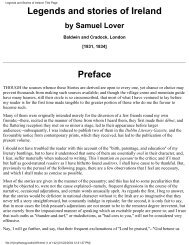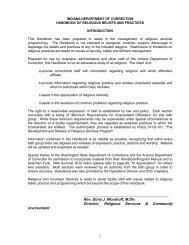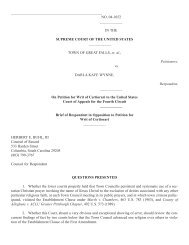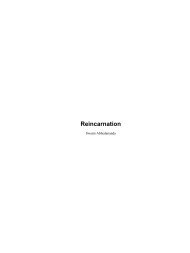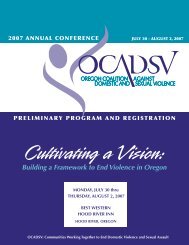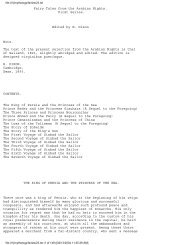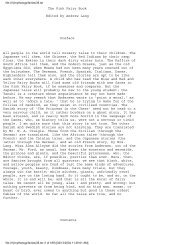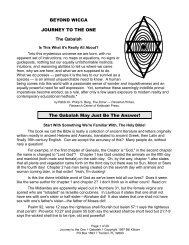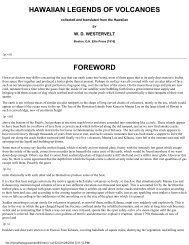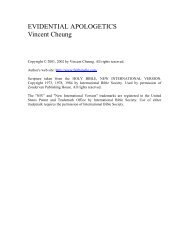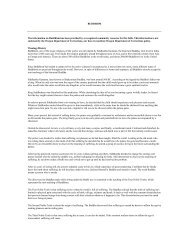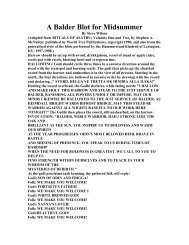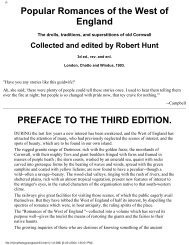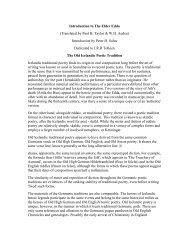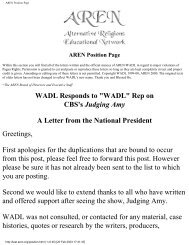Irish Druids And Old Irish Religions PREFACE CONTENTS
Irish Druids And Old Irish Religions PREFACE CONTENTS
Irish Druids And Old Irish Religions PREFACE CONTENTS
You also want an ePaper? Increase the reach of your titles
YUMPU automatically turns print PDFs into web optimized ePapers that Google loves.
The Tuatha have been improperly confounded with the Danes. Others give them a German origin, or a Nemedian one. Wilde describes<br />
them as large and fair-complexioned, carrying long, bronze, leaf-shaped swords, of a Grecian style, and he thinks them the builders of the<br />
so-called Danish forts, duns, or cashels, but not of the stone circles. McFirbis, 200 years ago, wrote--"Every one who is fair-haired,<br />
revengeful, large, and every plunderer, professors of musical and entertaining performances, who are adepts of druidical and magical arts,<br />
they are the descendants of the Tuatha-de-Danaans."<br />
"The Danans," O'Flanagan wrote in 1808, "are said to have been well acquainted with Athens; and the memory<br />
p. 103<br />
of their kings, poets, and poetesses, or female philosophers, of highest repute for wisdom and learning, is still preserved with reverential<br />
regret in some of our old manuscripts of the best authority." Referring to these persons, as Kings Dagad, Agamon and Dalboeth, to Brig,<br />
daughter of Dagad, to Edina and Danana, he exclaimed, "Such are the lights that burst through the gloom of ages?' The Tuatha, G. W.<br />
Atkinson supposes, "must be the highly intellectual race that imported into Ireland our Oghams, round towers, architecture, metal work,<br />
and, above all, the exquisite art which has come down to us in our wonderful illuminated <strong>Irish</strong> MSS." The polished Tuatha were certainly<br />
contrasted with the rude Celts. Arthur Clive declares that civilization came in with an earlier race than the Celts, and retired with their<br />
conquest by the latter.<br />
"The bards and Seanachies," remarks R. J. Duffy, "fancifully attributed to each of the Tuath-de-Danaan chiefs some particular art or<br />
department over which they held him to preside;" as, Abhortach, to music. The author of <strong>Old</strong> Celtic Romances writes--"By the Milesians<br />
and their descendants they were regarded as gods, and ultimately, in the imagination of the people, they became what are now in Ireland<br />
called 'Fairies." They conquered the Firbolgs, an Iberian or a Belgic people, at the battle of Moytura.<br />
There is a strong suspicion of their connection with the old idolatry. Their last King was Mac-grene, which bears a verbal relation to the<br />
Sun. The Rev. R. Smiddy assumes them descendants of Dia-tene-ion, the Fire-god or Sun. In the Chronicles of Columba we read of a<br />
priest who built in Tyrconnel a temple of great beauty, with an altar of fine glass, adorned with the representation of the sun and moon.<br />
Under their King Dagda the Great, the Sun-god, and his wife, the goddess Boann, the Tuaths were once<br />
p. 104<br />
pursued by the river Boyne. This Dagda became King of the Fairies, when his people were defeated by the warlike Milesians; and the<br />
Tuatha, as Professor Rhys says, "formed an invisible world of their own," in hills and mounds.<br />
In the Book of Ballimote, Fintan, who lived before the Flood, describing his adventures, said--<br />
"After them the Tuatha De arrived<br />
Concealed in their dark clouds--<br />
I ate my food with them,<br />
Though at such a remote period."<br />
Mrs. Bryant, in Celtic Ireland, observes:--"Tradition assigns to the Tuatha generally an immortal life in the midst of the hills, and beneath<br />
the seas. Thence they issue to mingle freely with the mortal sons of men, practising those individual arts in which they were great of yore,<br />
when they won Erin from the Firbolgs by 'science,' and when the Milesians won Erin from them by valour. That there really was a people<br />
whom the legends of the Tuatha shadow forth is probable, but it is almost certain that all the tales about them are poetical myths."<br />
Elsewhere we note the Tuath Crosses, with illustrations; as that Cross at Monasterboice, of processions, doves, gods, snakes, &c. One <strong>Irish</strong><br />
author, Vallencey, has said, "The Church Festivals themselves, in our Christian Calendar, are but the direct transfers from the Tuath de<br />
Danaan ritual. Their very names in <strong>Irish</strong> are identically the same as those by which they were distinguished by that earlier race." That<br />
writer assuredly did not regard the Tuatha as myths. Fiech, St. Patrick's disciple, sang--<br />
"That Tuaths of Erin prophesied<br />
That new times of peace would come."<br />
Magic--Draoideachta--was attributed to the <strong>Irish</strong> Tuatha, and gave them the traditional reputation for wisdom.<br />
p. 105<br />
"Wise as the Tuatha de Danaans," observes A. G. Geogbegan, "is a saying that still can be heard in the highlands of Donegal, in the glens<br />
of Connaught, and on the seaboard of the south-west of Ireland." In Celtic Ireland we read--"The <strong>Irish</strong> worshipped the Sidhe, and the<br />
bards identify the Sidhe with the Tuath de Danaan.--The identity of the Tuath de Danaan with the degenerate fairy of Christian times<br />
appears plainly in the fact, that while Sidhes are the halls of Tuatha, the fairies are the people of the Sidhe, and sometimes called the Sidhe<br />
simply."<br />
The old <strong>Irish</strong> literature abounds with magic. Druidic spells were sometimes in this form--"I impose upon thee that thou mayst wander to<br />
and fro along a river," &c.<br />
In the chase, a hero found the lost golden ring of a maiden --<br />
"But scarce to the shore the prize could bring,<br />
file:///I|/mythology/witchcraft/8/8.html (38 of 114) [02/05/2004 8:38:14 AM]



